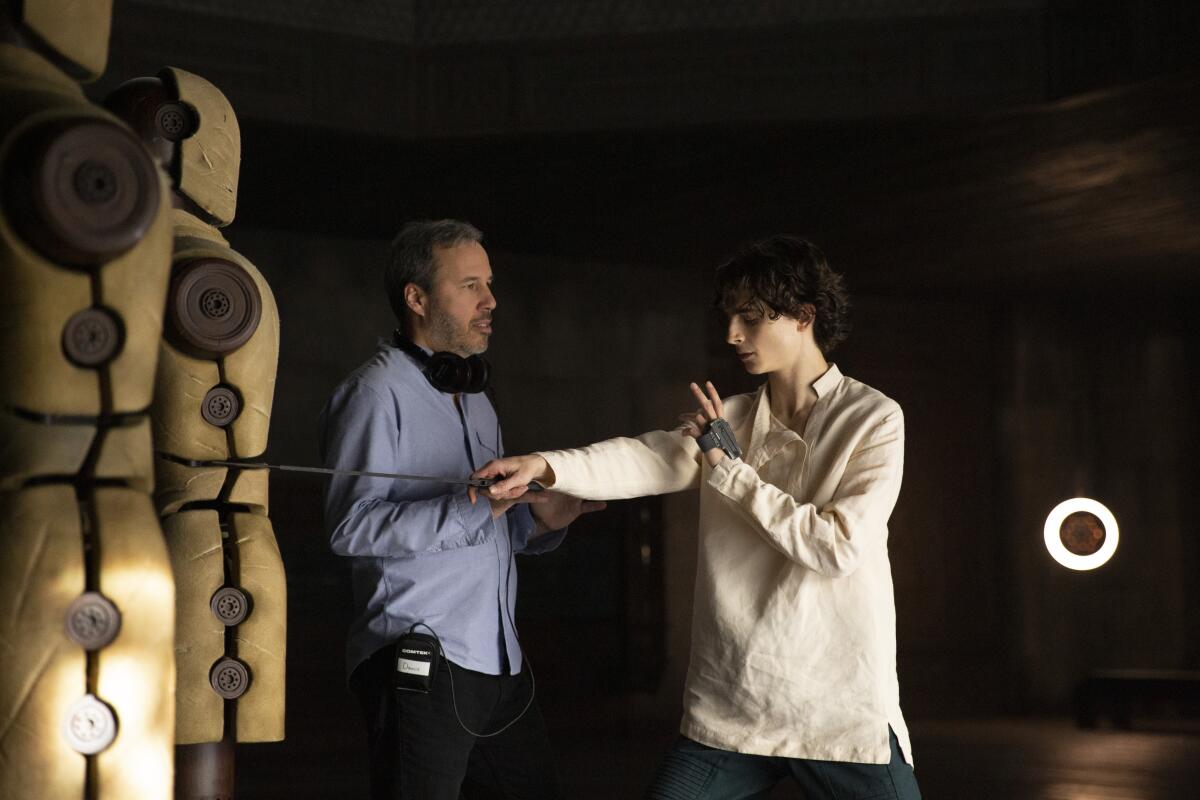Denis Villeneuve: Zendaya ‘will be much more prominent’ in ‘Dune’s’ second part

- Share via
Director Denis Villeneuve first encountered the classic sci-fi novel “Dune” when he was 13. While most of his peers were off playing hockey, he and bestie Nicolas Kadima were home with pads and pencils drawing images from the book.
“We were like two nerds at the end of a dark corridor, drawing storyboards for a movie that would never exist,” he tells The Envelope. Except it does exist. “Dune” is the dream project for the French Canadian director, who has made science fiction a specialty with his last three outings — “Arrival,” “Blade Runner 2049” and now “Dune.”
Based on Frank Herbert’s 1965 novel, the film features an all-star cast led by Timothée Chalamet as the preternaturally gifted young nobleman Paul Atreides coming of age on the hostile desert planet of Arrakis. Barren to the naked eye, the desert is rich in resources guarded by monstrous sandworms large enough to consume a small village in one gulp. The film also stars Rebecca Ferguson as Paul’s sorceress mother, Lady Jessica Atreides, and Oscar Isaac as his father, Duke Leto Atreides. Rounding out the cast are Stellan Skarsgard, Jason Momoa, Josh Brolin, Javier Bardem, Dave Bautista and Charlotte Rampling.
It’s no surprise that A-list talent wants to work with Villeneuve, although he attributes his enviable cast to the book’s broad appeal. Not even sandstorms could dampen the mood on location in Jordan’s Wadi Rum and Rub’ al Khali in Abu Dhabi. “I was working with all big movie stars, and they were all coming on set like actors, no egos,” he recalls. “Frankly, we were all saying to ourselves, ‘One of them will be an a—.’ Nobody. They were all inspirational.”
Seen only in glimpses is Chalamet’s leading lady, Zendaya, a desert dweller who has perfected survival techniques in the wild. For Chalamet, who was in his early 20s during production, someone his own age was a welcome addition to the cast.
“I saw the smile he had on his face when Zendaya came in, because finally he would be able to share the experience with someone from his generation. They became friends spontaneously. It was beautiful to see that happening on set,” Villeneuve says. “In this first movie, we see glimpses of her character. She will be much more prominent in the second one.”
That’s right, two movies. But rather than shoot both simultaneously, Warner Bros. chose to wait before greenlighting Part 2. But with global box office hitting nearly $400 million, giving the go-ahead for the second half of the story was an easy call.
A book that puts world-building and theme ahead of plot might not seem like a comfortable fit for conventional Hollywood storytelling. It could be why David Lynch’s 1984 adaptation stumbled so infamously.
Assuming he didn’t want to talk about a movie he publicly disowned on release, Villeneuve did not reach out to Lynch. “I could meet with David for lunch, but we will talk about yoga or meditation, parenting, anything but ‘Dune.’”
Villeneuve expresses great reverence for Lynch as well as eccentric filmmaker Alejandro Jodorowsky, whose proposed 12-hour adaptation of the book starring Mick Jagger, Salvador Dali and Orson Welles never got off the ground in the 1970s.
A proponent of movies on the big screen, Villeneuve planned for his two-part “Dune” to be in theaters in October 2020 before eventually landing on HBO Max. But the release got pushed a year with the COVID-19 pandemic, along with Warner Bros.’ announcement that 2021’s entire slate would be released day and date in theaters and on the platform.
“I think it was a bad decision,” the director says, adding that his relationship with the studio is on excellent footing. “I designed the movie to be seen in the theater, not on TV. If people are in a safe environment, it needs to be seen on the big screen.”
From a middle-class family of six in Gentilly, in the Canadian province of Quebec, Villeneuve and his younger brother Martin both grew up to be filmmakers. Denis had stepped away from filmmaking after experiencing some success in the 1990s with his directorial debut, “August 32nd on Earth,” featured in the Un Certain Regard section at the 1998 Cannes Film Festival, and his follow-up, “Maelström,” winning Best Canadian Film at the 2000 Toronto International Film Festival.
In 2010, he returned with a vengeance, directing “Incendies, which earned an Oscar nomination for foreign language film. In 2017, he was nominated for his work on “Arrival,” which received eight nods in all, including a win for sound editing.
And he has much ahead of him. His slate includes “Dune: The Sisterhood,” an HBO Max prequel series and, for the same platform, “The Son,” starring Jake Gyllenhaal. After the second “Dune” movie, he will return to the desert for “Cleopatra.”
In his first meeting with Hans Zimmer, Villeneuve and the composer talked about the perils of pursuing childhood dreams. “There’s something ultimate about that idea. Is it a good idea to try to reach for that dream? Are we bound to fail?” he asks, thinking back to his 13-year-old self drawing storyboards. “That was a big challenge to please the teenager I was back then.”
More to Read
From the Oscars to the Emmys.
Get the Envelope newsletter for exclusive awards season coverage, behind-the-scenes stories from the Envelope podcast and columnist Glenn Whipp’s must-read analysis.
You may occasionally receive promotional content from the Los Angeles Times.









